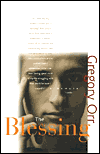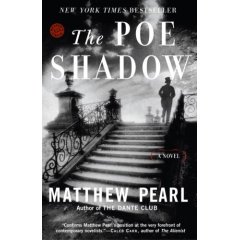
|
Jim Doss is co-editor of Loch Raven Review. He was born and
raised in the foothills of the Blue Ridge
Mountains. He has lived most of his life in the mid-Atlantic region with
the exception of several years in Arizona. His work has appeared in
Poetry East, Words-Myth, Poems Niedergasse, and other publications. A
graduate of the University of Virginia, he earns his living as a
software engineer, and lives with his wife and three children in
Maryland.
Gregory Orr is the author of nine books of poetry, the most recent being Concerning the Book That Is the Body of the Beloved issued by Copper Canyon Press. He is a professor at the University of Virginia, where he has taught since 1975. Matthew Pearl is the much-acclaimed author of the international bestseller The Dante Club. |
Fall 2007 Table of Contents - Vol. III, No. 3 |
|
|
Poetry Translations Interview Essays Fiction Book Notes & Reviews |
|
|
Gregory Orr,
The Blessing:
A Memoir,
Council Oaks Books, ISBN 1-57178-141-2, 209 pages, 2004, $14.95. I am ashamed to admit that this book sat on my shelf unread for several years. This is by no fault of the author, just my own hectic work schedule that has me bouncing from one thing to the next. Recently, though, I grabbed his book by chance as I was heading out the door for a cross country business trip. I was lucky enough to have several quiet hours at the airport and on the plane. and was able to read Orr's memoir from cover to cover in one sitting. And quite a book it is. For those lucky enough to own Orr's early books of
poetry (i.e., Burning the Empty Nests, Gathering the Bones
Together, The Red House, and City of Salt), The
Blessing provides the historical and psychological narrative that
gives context to those highly imagistic volumes. From mysterious
poems like: or: The DollI carry you in a glass jar. Your face in porcelain except for the bullet hole like a black mole on your cheek. I want to make you whole again, but you are growing smaller. It is almost too late. When I touch you my fingers leave dark smudges on your skin. Each day you are growing smaller and more intense, like a drop of acid on my palm; mothball, snowflake, dead child. (From Burning the Empty Nests) Orr fashions a private mythology that has slowly revealed itself over the years to culminate in this memoir of his turbulent adolescence and young adulthood. The Blessing begins with the central event in Orr's life: the death of his brother Peter by his own hand in a hunting accident when he was twelve. The first sentence sets the tone of the book: Do I dare say my brother's death was a blessing? Who would recoil from first from such a statement? A reader, unsure of its context, but instinctively uneasy with the sentiment? Or me, who knows more of the context than I sometimes think I can bear, having spent most of my life struggling with that death because I caused it.Within the first page Orr goes on to discuss the entomology of the word blessing: In French, the verb blesser means "to wound." In English,"to bless" is to confer spiritual power on someone or something by words or gestures.... It comes from the Old English bletsian which meant "to sprinkle with blood" which makes me think of ancient, grim forms of religious sacrifice where blood not water was the liquid possessing supernatural power-- makes me remember standing as a boy so close to a scene of violence that the blood of it baptized me. How can such a horrific event be transformed by the surviving brother into a blessing? In crisp, economical prose, and short chapters filled with rich detail, Orr takes the reader on a spiritual journey covering the years twelve through nineteen in his life-- his intense feelings of guilt immediately following the accident, his parents inability to comfort him, speak about the accident or be sensitive to his need for comfort and healing, the sense of isolation, the solace he found in the story of Cain, a year in Haiti, the premature death of his Mother following a routine operation, his secrete death wish in getting involved with the civil right movement in the South, and finally his introduction to poetry and writing. Orr outlines his quest succinctly: How could I live in a world where everything was random, where Accidentruled and where one day I might wake to sunshine and blue sky and another, find my own brother dead at my feet? Accident. Unbearable word, unbearable world.... And wasn't that what I wanted and desperately needed that day of Peter's death: a world where meaning existed? As I read The Blessing, the word genesis kept popping into my mind-- both in the Biblical sense of the loss of innocence, the murder of Cain by Able and subsequent banishment; but genesis is also the story of the origin and beginning of life, Orr's rebirth, how he emerges from tragedy to discover his purpose in life. In the chapter on his poetic awakening and influences, it is no surprise to learn that Orr feels a close kinship with the guilt-ridden, enigmatic Austrian poet Georg Trakl, and here he partially quotes one of Trakl's aphorisms: Feeling in the moments of deathlike existence:all people are worthy of love. Awakening you feel the world's bitterness; in it is all your unresolved guilt; your poem an imperfect atonement. Orr's testimony is alternately highly-introspective, touching and revelatory. The events that shaped his youth gradually give way to beauty and power of metaphor to transform. The Blessing is an intense look at how those dark realms of the soul can be penetrated and revealed before they consume. The book ends with Orr being taken by one of his high school teachers to David Smith's house, a sculptor who had been killed in a car accident, but whose numerous works still populated the fields around his house, a garden of metal people all conjured from one man's imagination, some made of iron and splattered with rust the color of blood. In this garden of the undead, Orr stumbles upon the meaning he has been searching for-- the survivor's duty to "celebrate the will to live," and "the passion to dramatize what it means to be alive." The Blessing is well worth the investment, and a book that deserves to be read more than once. It is difficult not be awed by Orr's story.
Matthew Pearl,
The Poe Shadow,
Random House, ISBN 978-0-8129-7012-8, 399 pages, 2007, $13.95. The black cover of this book along with its gas-light era photograph initially attracted my attention on the newsstand. But when I read the back cover and discovered this was a historical mystery novel concerning the mysterious death of Edgar Allan Poe, and that it was set primarily in the Baltimore of the late 1840's to early 1850's, I had to buy it. In 1849, Poe set out on a journey from Richmond to Philadelphia to take on a lucrative editing job. He went missing, only to mysteriously turn up in Baltimore, where he was found on the sidewalk outside a tavern apparently drunk and disoriented. Poe died after several delirium-filled days at Washington College Hospital. How he got to Baltimore, what he did in the few days that he was there, and the circumstances of his death remain an unsolvable mystery. The Poe Shadow attempts to partially fill this gap. The story centers around Baltimore lawyer Quentin Clark, and his growing obsession with Poe. Clark, already a Poe fan, unwittingly witnesses the author's small funeral and internment in an unmarked grave. Only after reading newspaper announcements of Poe's death does he realize what he has seen, and the unflattering descriptions of Poe as a person and writer send Clark on a quest to reconstruct Poe's last days, clear his good name and firmly establish Poe's reputation as a writer of genius. As his obsession grows Clark sacrifices everything, career, marriage in his pursuit of Poe's last days. He travels to Paris to find the real life model for Poe's fictional detective C. Auguste Dupin of The Murders in the Rue Morgue fame in the person of Auguste Duponte, and convinces him to return to Baltimore to reconstruct Poe's last days and death using his fabled ratiocination technique. From here the intrigue sets in with kidnappings. murder, two sleuths in competition pursuing the Poe mystery, and foreign conspiracies. The events of Poe's last days and death are never truly unraveled in the book, but how could they be? Poe's Baltimore demise is the central focus point of the story that brings the cast of characters together, each with their separate motives for piecing together Poe's last days. On the positive side, The Poe Shadow is meticulously researched to the point of uncovering some new historical details about Poe's death and its aftermath. This detail is woven seamlessly into a narrative that intermingles living and fictional characters. On the negative side, the prose style, which attempts to imitate nineteenth century writing, is dry and fluffy to the point of occasional boredom; the character of Quentin Clark is singularly uninteresting as a narrator and his Poe obsession stretches the limits of believability; and, finally, the story doesn't match the manic pitch of Poe's tales, which it clearly hopes to imitate. But my chief criticism is that for a suspense novel it could use more thrilla and less vanilla (please excuse the bad pun). The story does drag on at times to the point some chapters are difficult to get through. Some judicious trimming could have shrunk the book by 75-100 pages and improved the pacing of story. I admire the ambitiousness of Pearl's vision in this novel, and his willingness to tackle a difficult if not impossible subject, he just doesn't quite pull it off in an engaging enough manner to hold the interest of most readers.
© Jim Doss |
|
|
Poetry Translations Interview Essays Fiction Book Notes & Reviews |

